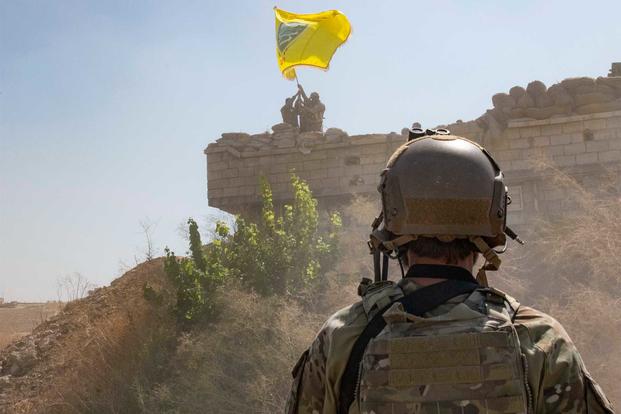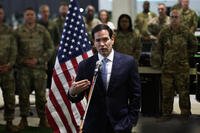Joseph V. Micallef is a best-selling military history and world affairs author, and keynote speaker. Follow him on Twitter @JosephVMicallef.
An Interview with Dr. Anne Speckhard, director of the International Center for the Study of Violent Extremism
On Oct. 9, Turkish military forces and their affiliated Syrian militias began an invasion of the area in Northern Syria held by the predominantly Kurdish-led and -staffed Syrian Democratic Forces (SDF).
Within hours of the invasion, there were widespread reports of indiscriminate bombings of civilian areas and that Free Syrian Army militia units operating under Turkish direction were engaging in summary executions of Kurdish activists.
U.S. President Donald Trump, after acknowledging that the U.S. would withdraw its advisers in the area and would not do anything to stop the invasion, then seemed to reverse course, tweeting that the U.S. would "destroy the Turkish economy" if Ankara acted inappropriately.
Exactly what that meant was never defined, and that threat was quickly replaced by more tweets stating that the U.S. had wasted eight trillion dollars and thousands of American casualties as a result of its Mideast interventions and that it was time to get out of "these endless wars."
That was followed by a bizarre tweet from President Trump in which he castigated the Kurds for not aiding the U.S. during the Second World War and especially during the Normandy landings. In the meantime, there were widespread reports of hundreds of outbreaks by detained ISIS militants from SDF-run prison camps.
On Sunday evening, local time, in an abrupt reversal of alliances, the SDF announced that it had struck a deal with the Assad government to have Syrian military forces take over the border areas along the Syrian-Turkish frontier, including the cities of Kobane and Manbij. The alliance of the SDF and the Russian-backed Assad government, according to an SDF spokesman, "paves the way to liberate the rest of the Syrian cities occupied by the Turkish army."
The lesson underscored by the newfound alliance between the SDF and Assad was not lost on the rest of the Middle East: Russia would stick with its allies; the U.S. would not!
As these events unfolded, I sat down with Dr Anne Speckhard, director of the International Center for the Study of Violent Extremism (ICSVE) and an adjunct professor of psychiatry at Georgetown University School of Medicine, to get her perspective.
JM: You have been traveling to Syria for several years now, interviewing detained Islamic State militants. At last count, over 200 of them. What's your assessment of their motivation? Are they ready to rally again to create a new Islamic State if they are given a chance?
AS: I'm a research psychologist, and I've been in-depth interviewing terrorists for over 20 years, and have spoken to over 600 of them, 200 recently who were with ISIS. Their motivations were many and varied. Some came for economic gain, others to escape life problems, or believing that the marginalization and discrimination they were living under as Muslims in their home countries would not be present in the Caliphate. Many young men who came early, came to fight Assad and stand up for Muslim victims of his many atrocities.
Remember: Assad's forces killed many more than ISIS ever did. Many came out of religious belief and obligation, expecting to live under an Islamic State and to help build it, believing it would be an Islamic utopia. Some came for marriage, love, adventure. … There are as many combinations of motivational states as there are fighters and family members who came, which is over 40,000. And please keep in mind, children had no choice in coming. Their parents brought them and birthed them inside the Caliphate without ever asking if they wanted to be part of it, and now many of these same children are imprisoned in camps.
Of the 200, mostly adults, that we have interviewed, about 100 were in SDF territory. They are, for the most part, tired of ISIS and not interested to continue the fight. They ask to be taken to their home countries and face justice. There are exceptions, of course, and some that are still dedicated ISIS enforcers in the family camps and ideologues in the prisons, but they are the exceptions. Most are battle exhausted, disillusioned of ISIS and want to give it up entirely.
JM: The Syrian Democratic Forces, the People's Protection Units (YPG) and their female counterparts (YPJ) were the boots on the ground in the fight to defeat the Islamic State (ISIS). How would you describe their role? Could ISIS have been defeated without their involvement?
AS: The male and female People's Protection Units (YPG and YPJ) fought valiantly against ISIS. They lost 11,000 lives, and some of those who survived are severely wounded, in wheelchairs, with lifelong injuries, blinded, etc. And everyone lost family members to ISIS. The U.S. forces lost less than six lives as we provided advice and airpower to the YPG and YPJ. These are some of the bravest women and men we have ever witnessed who stood up to ISIS at great cost.
Please also keep in mind that ISIS was not content to only conquer large swathes of Iraq and Syria. Their ISIS Emni (external security operations) planned and carried out attacks in Brussels, Paris, Nice, London, New York and elsewhere. I was in Brussels and was supposed to fly the day they exploded the airport. I'm grateful that the YPG and YPJ contained ISIS, defeated them territorially and up till now have continued the fight against them, holding the prisoners humanely despite overcrowded conditions and continuing to try to root out the many sleeper cells that were attacking on a weekly basis. We could not have had more valiant and truer partners. That Turkey calls them terrorists is despicable.
JM: Turkish President Recep Tayyip Erdogan has been pushing for a free hand in Kurdish areas of northern Syria. He already seized control of Afrin province, a heavily populated Kurdish area. What happened there and is this an indication of Turkish objectives in the other Kurdish-held areas of Syria?
AS: In Afrin, Turkey took homes of Kurds and drove them out and placed Arabs in their places. Sinam Mohamed, who now lives in the U.S., told me of how her beautiful Afrin home was overtaken, her factories looted and the equipment taken back to Turkey, and that her family was driven out never to return to their farms and livelihood. Once wealthy, the family is now impoverished and spread out over the globe, having fled Afrin. Theirs is just one of many such stories. Yesterday, Turks shelled all along the borders. The SDF sent us a picture of a young boy under age five lying on the ground -- killed by Turkish bombs. Is this the PKK they wished to eliminate? These areas where Turks are incurring are heavily populated, and they look to be aiming to do a massive population displacement with no regard to human rights.
JM: The Trump administration has until now resisted Turkish attempts to invade northern Syria. In September, Erdogan indicated that he had reached an agreement with President Trump for the removal of American troops from the region. The Trump administration subsequently reversed its decision, and the SDF agreed to pull back their checkpoints from along the border and agreed to Turkish patrols on the Syrian side of the frontier. Is there any chance that the Trump administration would again reverse its decision? Are there any additional concessions that the SDF can make to keep the Turkish military at bay? Is it too late now?
AS: With President Trump, there are always chances he will go back on his word, as he is not a steady leader who stays the course, often reversing what he proclaimed the day before. The originally negotiated joint patrols are what should be instituted with a no-fly zone and U.S. guarantees of SDF protection. There is no need for this war and military incursion. I have seen no evidence that the PKK is mounting attacks into Turkey from Syria, where it is clear the PKK is a Turkish problem that they have themselves failed to adequately address. Turkish scholars tell me that the PKK is able to and routinely does recruit in Turkey, which is totally a domestic issue requiring resolution at home, not in Syria. Likewise, the Turks are successfully deploying drones and air force against the PKK in Iraqi Qandil mountains. There is no need to incur in Syria, and the U.S. should quickly go back to its position of joint patrols in a smaller zone and enforce such with a no-fly zone. That we would acquiesce to Turkish demands without evidence that PKK is active in these zones and allow this violence is a shame to us. It costs us no American lives to offer airpower and protection to our Kurdish allies.
JM: There are over 60,000 ISIS sympathizers and family members of ISIS militants being held in camps in Syria. You and others have warned that mass outbreaks are likely and that many of these detainees might take up arms again. Numerous outbreaks have already been reported. Is there anything that can be done to keep these prisoners secure? Is the Turkish military likely or willing to accomplish this?
AS: I don't believe that many of the 60,000 would go back to taking up arms, but with this chaos created at present, perhaps they would see it as a possibility. Given they have no legitimate pathways home, I would expect them to go into hiding and think over their options -- one being rejoin the group, another being try to enter Turkey and live underground there, which had been the hope of many realizing they cannot go home. Another would be to slowly make their ways home. Either way, it's dangerous and not a good option to destabilize what already is an overcrowded and distressing prison environment. Turkey may be able to secure them, but they were already being held securely and SDF has a good record of treating prisoners humanely. I don't know if Turkey would do the same.
JM: It looks like the SDF will align itself with the Assad government and its Russian and Iranian backers. Can you shed any light on what is happening there? What are the consequences of the SDF's new alliance?
AS: The Assad government has insisted to place top-down governance in areas held by the SDF and that goes against Kurdish philosophy of democratic grassroots-up governance. Assad may win that battle, and the newest budding democracy in the Middle East will have been destroyed in its infancy.
JM: Turkey is ostensibly a member of NATO. Germany, France and the U.K. have already condemned the Turkish invasion. How do other NATO members view the Turkish incursion? More importantly, how do they view the Trump administration's treatment of America's Kurdish allies?
AS: I think most are confused by this abrupt change of events and policy. Most European countries have as their major concern not to have more refugees streaming into Europe, and Turkey holds the gate keys for that. That refugees will be forcibly sent back to Syria may be welcome to them, but Europeans traditionally stand up for human rights, so they are likely to protest Turkey's actions. Forcible deportations and resettlements of Syrian refugees from Turkey would not be something the EU would support.
JM: ISIS leader Abu Bakr al-Baghdadi has not been captured and is presumably alive. Much of the core leadership of the Islamic State is still alive. Are they in communication with their supporters in Syria and Iraq, both the detained ones and those still at large?
AS: Baghdadi has given two speeches urging his followers to continue the fight, spread it globally and to break out the ISIS prisoners. Some women in the camps have illicit phones and may or may not communicate with them. Likely the hardcore enforcers do, as they believe their men will come and rescue them and reinstitute the Caliphate, which terrifies the majority of women who never want to see ISIS again.
JM: There have been consistent reports that militia units affiliated with the Turkish military have recruited former ISIS militants and used them in operations against Kurdish forces in Afrin. Is there any definitive evidence of this?
AS: SDF claims they have a great deal of evidence that the so-called "Free Syrian Army" that Turkey uses is made up of former ISIS members who Turkey aligned with in the past to fight the Kurds. I have not interviewed any of them, but I would not be surprised if that is true.
JM: There are some 8,000 ISIS militants being detained by the SDF. At least 2,000 of them are foreign, and it's estimated that around 1,000 of them are European. What's going to happen to those militants? Already, there have been reports of widespread escapes. The SDF has announced that it will withdraw many of the units tasked with guarding the prisoners to meet the Turkish invasion. Will the Turkish military end up being responsible for these prisoners? Why should the SDF continue to be responsible for detaining these militants if the rest of the world is turning their back on them?
AS: That remains to be seen. It depends on how far the Turks incur. The SDF has no wish to free the prisoners they lost their lives fighting and capturing, and I believe they will do their best to keep them secured unless it proves impossible to stay alive while so doing.
JM: You've said that the SDF has been preparing for their eventual abandonment by the United States. What sort of step has the SDF taken to resist the expected Turkish incursion? How would you rate their chances?
AS: SDF are armed, they have dug tunnels throughout the area and thus can move underground and avoid air detection, but they are no match for the Turkish army, which is the second largest army in NATO with a huge air force, latest technology, drones, etc. We have left them to a slaughter. What choice do they have but to fight when it's their land? They have the Afrin example in front of them, and they are being called terrorists who Turkey wishes to kill.
JM: What do you think Syria will look like two years from now?
AS: Judging from current events, a mess. I was really hoping the SDF-held areas would grow into a real democracy and perhaps enlighten the rest of the area regarding what is possible. That is still possible if President Trump rethinks his abandonment of our true and real allies. Perhaps our Congress can change his course.
JM: Bret McGurk, the U.S. Special Envoy for the fights against ISIS from 2015-2018, denounced the Trump administration's abandonment of the SDF, noting that:
"Donald Trump is not a Commander-in-Chief. He makes impulsive decisions with no forethought or deliberation. He sends military personnel into harm's way with no backing. He blusters and then leaves our allies exposed when adversaries call his bluff, or he confronts a hard phone call."
If you had the opportunity to speak to President Trump what would you advise him to do?
AS: Be a man, stay the course, listen to your military who admire the SDF units who fought valiantly on our behalf, support the newest democracy in the Middle East that is giving women and minorities their rights. It's not a perfect democracy, but it's an amazing one, given it sprang up in the middle of war. Tell the Turks to back out of Syria, that the Kurds are our allies, not terrorists. If there are any PKK actions from SDF territory, insist with the SDF that these people be arrested and brought to justice. I am aware of NONE.
-- The opinions expressed in this op-ed are those of the author and do not necessarily reflect the views of Military.com. If you would like to submit your own commentary, please send your article to opinions@military.com for consideration.















